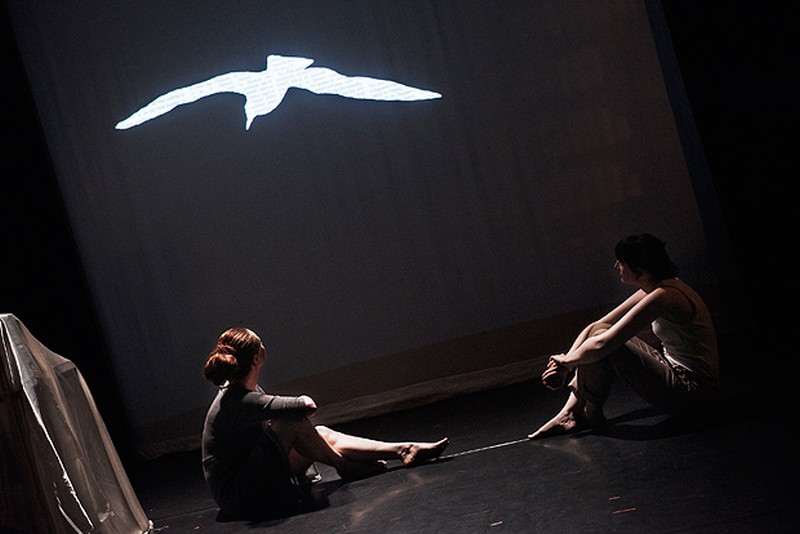 With its title hinting towards a way of life and method of survival now the stuff of history lessons, this production invites us in to ‘meet Ireland’s most hated woman’. The woman turns out to be Peig, author of Peig: The Autobiography of Peig Sayers of the Great Blasket Island, a real book at the heart of the Gaelic revival of the mid-twentieth century and reviled by generations of Irish schoolchildren who had to study its unending bleakness and complex Gaelic prose. Eating Seals and Seagulls’ Eggs is created by playwright Catriona Ni Mhurchu, who also performs as Peig, alongside fellow performer Louise Lewis, who narrates and multiroles the other parts. The show explores the intriguing and brutal lives of the residents of Blasket, a tiny island home to 150 residents living in traditional values and in extreme poverty during the first part of twentieth century, whose stories were recorded by the illiterate Peig via dictation in their mother tongue in the period before they were eventually removed from their home.
With its title hinting towards a way of life and method of survival now the stuff of history lessons, this production invites us in to ‘meet Ireland’s most hated woman’. The woman turns out to be Peig, author of Peig: The Autobiography of Peig Sayers of the Great Blasket Island, a real book at the heart of the Gaelic revival of the mid-twentieth century and reviled by generations of Irish schoolchildren who had to study its unending bleakness and complex Gaelic prose. Eating Seals and Seagulls’ Eggs is created by playwright Catriona Ni Mhurchu, who also performs as Peig, alongside fellow performer Louise Lewis, who narrates and multiroles the other parts. The show explores the intriguing and brutal lives of the residents of Blasket, a tiny island home to 150 residents living in traditional values and in extreme poverty during the first part of twentieth century, whose stories were recorded by the illiterate Peig via dictation in their mother tongue in the period before they were eventually removed from their home.
There is a stylish feel to the piece from the start, the collaborative influences of visual artists Adam Gibney and sound designers Bird in Wire being clear in the use of a rich variety of projected archival footage to provide the necessary context, accompanied with an atmospheric tapestry of sounds. This introduction to the Islanders really excited my interest and introduced a sense of foreboding and tension, particularly in the use of a desperate telegram: ‘Storm bound distress. Send food. Nothing to eat’.
Peig herself is introduced via her book and through stylised snippets of information, which she often interrupts. Her performance is framed as a retrospective, Peig states that she is ‘already dead’ and her graceful and sometimes seemingly sexualised movements and slinky modern dress are far removed from the ancient Islander. The approach brings Ni Mhurchu into focus and acts as a distancing technique which helps to reinforce the sense of Peig’s dislikability, cleverly aligning us with the feelings of Irish schoolchildren of yesteryear. However, even with the frame story – the life of an Irish schoolgirl in the 1980s – amusingly delivered by Lewis, there remained some references that went over my head having not grown up with this material.
One of the most fascinating elements for me was the exploration of the creation and possible censorship of the text itself, throwing up as it does numerous moral issues about ownership and the treatment of verbatim accounts. It seems that there are those who believe that the book is largely fabricated, presenting Peig as a woman unable to tell the truth, and many of the parts deemed ‘unsuitable’ for the school curriculum (women drinking, laughing, killing pigs) have long been edited out.
The production presented a very well formed concept imaginatively, using multi-layered narrative, and smoothly blending history and fiction with a strong narrative and plenty of humorous asides. It’s rich in intrigue and ideas, but balancing all of this, the disjointed style sometimes challenged my focus.
